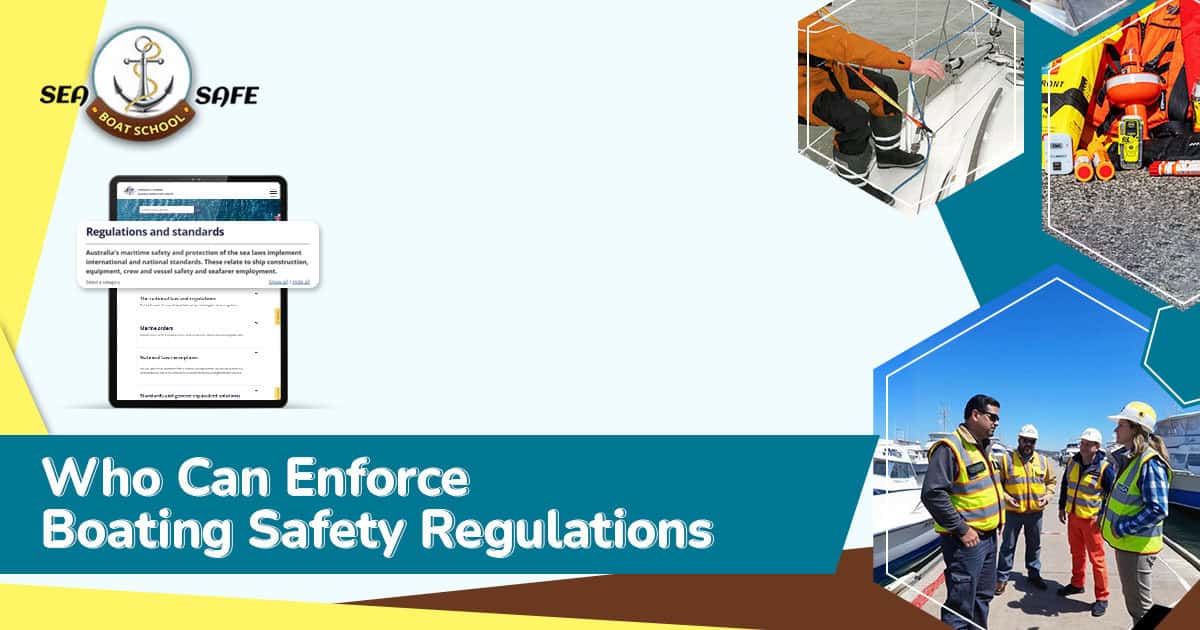Like Our Page :
Sea Safe Boat School
Arran
0429 146 201
Like Our Page :
Sea Safe Boat School
Arran
0429 146 201

Australia is renowned for its beautiful coastlines and waterways, making boating a popular pastime for many. However, to ensure safety on the water, every vessel operator needs to understand who can enforce boating safety regulations and how these rules help keep everyone safe.
This article will help you navigate through the various authorities responsible for enforcing these regulations and explain the importance of tools like VHF radios, particularly in Western Australia (WA). In Australia, several authorities are tasked with enforcing boating safety regulations.
The enforcement varies based on the type of vessel and the state or territory in which you are boating. Here’s a breakdown of the main players:
At the national level, the Australian Maritime Safety Authority (AMSA) is the key regulator for domestic commercial vessels. Established under the Marine Safety (Domestic Commercial Vessel) National Law Act 2012, AMSA is responsible for ensuring uniform adherence to safety standards across the nation.
This means that commercial vessels, whether fishing boats, ferries, or charter boats, are under the consistent oversight of AMSA. AMSA conducts inspections, sets safety standards, and ensures that commercial operators are educated about safety practices.
This national framework helps maintain high safety standards and reduces accidents on the water.
Each state and territory in Australia has its laws and agencies that handle the enforcement of boating safety regulations for recreational vessels. For example:
These local authorities have the power to conduct inspections of recreational vessels, ensuring compliance with safety standards and regulations. They also run educational programs aimed at increasing awareness and understanding of boating laws.
Local police officers and other authorised enforcement personnel can also enforce boating safety regulations. They have the authority to board vessels, conduct safety checks, and issue penalties for non-compliance.
This enforcement helps ensure that everyone on the water is adhering to safety laws, creating safer conditions for all.
While the enforcement of regulations is crucial, it’s equally important for boaters to be equipped with the right tools. One key safety device is the VHF radio.
In WA, as well as throughout the country, vessels are required to carry and use VHF radios. VHF radios are crucial for communication and emergencies.
They allow boaters to:
Having a VHF radio and knowing how to use it correctly is part of the general safety obligations for vessel operators. This includes understanding which channels to use for different communications and the protocol for emergency calls.
To sum up, understanding who enforces boating safety regulations in Australia involves knowing about various authorities, including AMSA and local state agencies. These organisations work together to ensure that all vessels comply with safety regulations, promoting a secure boating environment.
The importance of using VHF radios is crucial, especially in areas like WA, where clear communication is vital for managing emergencies effectively. Taking a VHF radio course with Sea Safe Boat School can help both seasoned boaters and beginners understand the regulations and safety equipment they need to have on board.
Familiarising yourself with local laws and ensuring you have the right communication devices, like VHF radios, not only keeps you compliant but also enhances the safety of you and your passengers. Before you head out on the water, take the time to review safety protocols and equipment requirements, and if you need assistance, don’t hesitate to contact us for a skipper ticket in Perth.
Safe boating is enjoyable boating, so make the most of your time on the water while ensuring everyone is safe and secure. Happy boating!

Mike Watson, chef instructor of Sea Safe Boat School, has over 35 years of sea-going experience. Starting his maritime journey at 15 in Grimsby, England, he's sailed locations like Iceland and Greenland. Certified as a Master-5 Trainer, Mike is now dedicated to offering courses to those pursuing their recreational skippers ticket in Perth.
Copyright all rights reserved © Sea Safe Boat School. Website by Selling Online Made Simple. Sitemap.